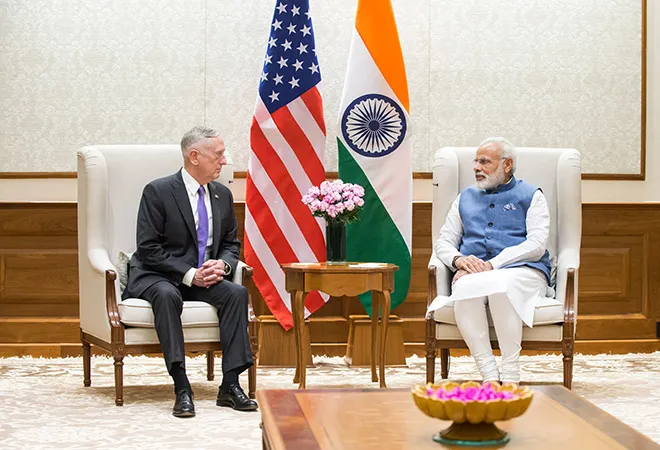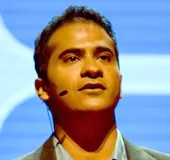-
CENTRES
Progammes & Centres
Location

There is an adage that is codified in American political parlance: ‘United We Stand, Divided We Fall’. It has been used time immemorial by stalwart figures such as the 16th President Abraham Lincoln and regurgitated in the days after the 9/11 aftermath, particularly to unite a healing country.
Yet, at the 2018 Shangri-La Dialogue, organised by the International Institute for Strategic Studies (IISS) in Singapore, one couldn’t help feel that US Secretary of Defense James Mattis didn’t get the memo.
Mattis reiterated the Trump administration’s Indo-Pacific strategy (a phrase popular with the current administration) which espouses the shared principles that underpin a free-and-open Indo Pacific. Mattis’ even pegged his opening salvo to Prime Minister Modi’s call to ‘a commitment to common values’ and ‘the foundation upon which a shared destiny can be built’.
"Mattis minced no words when he stated that “America is in the Indo-Pacific to stay”. Almost throwing the gauntlet down to Beijing, which has long seen the presence of US naval fleet in the South China Sea as brazen hostility."
While the former General spoke about convergence with India and ASEAN allies, Mattis warned that Washington intended for an Indo-Pacific region where territorial integrity and the freedom of navigation is upheld and safeguarded.
The former NATO commander addressed the ‘dragon in the room’ (pun intended) when he stated “we are aware China will face an array of challenges and opportunities in coming years. We are prepared to support China's choices, if they promote long-term peace and prosperity for all in this dynamic region”.
Washington has cast its net wide when looking at maritime security. Concerns previously were restricted to China’s expansionist agenda in the South China Sea. The wider Indo-Pacific strategy, a term former Indian Prime Minister Manmohan Singh once used, now reflects Washington and Delhi’s shared concerns on security across the vast swathes of the Indian Ocean.
South Block in New Delhi has had trepidations with China’s ‘String of Pearls’ encirclement, which features key Chinese naval bases in Sri Lanka, the Maldives, and Pakistan, coupled with a fortified China-Pakistan Economic Corridor (CPEC) towards the north on land.
For some, Washington is now speaking New Delhi’s concern. Mattis regurgitated a strong Indo-US alliance speaking about synergy with Prime Minister Modi and cited India “as a leader and responsible steward in the Indo-Pacific region”.
The White House’s message was clear, that it would look out for its smaller ASEAN allies and partners that have long seen China’s encroachment as blatant disregard for their territorial sovereignty.
Mattis highlighted US interests in the security, economic and development investments in the region. He said this would help ensure in a “safe, secure, prosperous, and free Indo-Pacific based on shared principles with all nations, large and small”.
"America’s four central tenets of the Indo-Pacific strategy were expanding attention on the maritime space. Second, interoperability. The third theme is strengthening the rule of law, civil society, and transparent governance. A fourth theme is the private sector-led economic development."
Trump’s defence chief gave assurances of strategic partnerships and not strategic dependence. Hence, Mattis urged ASEAN to speak in once voice, almost subtly calling out a few lose Beijing backers to eschew from China and stand with their ASEAN counterparts to “maintain a region free from coercion and one governed by respect for international law”.
Modi show
Indian Prime Minister Narendra Modi took a leaf out of Mark Anthony’s famous Friends, Romans, Countrymen speech in William Shakespeare’s seminal play – Julius Caesar. In this, Anthony condemned the conspirators for their assassination of Caesar without condemning them directly. He references them multiple times, while praising Caesar, yet immediately indicating that Caesar deserved to die, because the conspirators said so. This juxtaposition of right and wrong was picked up by the Romans in 44 B.C and they were able to read between the lines and decipher who the real culprits were.
Modi spoke with aplomb on India’s ambitious role on being “ready to help lead a free and fair Indo-Pacific”. There were no overt references but clearly veiled innocuous cautionary messages for both the United States and China to eschew from their geopolitical insecurity and focus on traditional regional security.
"India’s grand vision for the broader Indo-Pacific region was highlighted through what Modi described as SAGAR -- an acronym that stands for ‘Security and Growth for All in the Region’."
Modi tied in how the geoeconomic and geopolitical happenings of the Indo-Pacific was very much codified into India’s Act East policy.
The current global landscape has seen both United States and China being the pugnacious competitors on trade, security and other diplomatic brouhahas. Modi, however, spoke about a shared vision of an open, stable, secure and prosperous Indo-Pacific Region.
To achieve this, he called on the global community to rise above divisions and competition to work together. He stated this was evinced in an ASEAN model which represents an eclectic diversity of culture, religion, language, governance and prosperity of any grouping in the world.
It was Modi’s first appearance at Shangri-La Dialogue. Many geopolitical cognoscenti have yearned to see India play a bigger role at Asia’s premier security forum.
The leader of the world’s largest democracy almost picked up from where left off at the World Economic Forum at Davos. He championed India as a key player in the new liberal international order; perhaps fitting for Alyssa Ayres’ book – Our Time Has Come: How India is making its Place in the World!
Under an increasingly bellicose Trump administration prioritising protectionism, Modi championed the idea of a symbiotic synergy when he cautioned of “not returning to the age of great power rivalries”. He spoke about a uniform growing Asia and not an Asia of rivalry, which will halt progress. Modi’s message to both Beijing and Washington was coded in this line: “so, each nation must ask itself: are its choices building a more united world, or forcing new divisions?”
India is a crucial fourth member of the Quadrilateral Security Dialogue, also known as the Quad, a joint security initiative between the militaries of the United States, Australia, India and Japan. This is largely seen as a US led initiative to prevent Chinese belligerence in the Indo-Pacific.
Despite Modi’s message as a purveyor of peace, India has long been concerned with Chinese encirclement across land and sea. With India and China having had a tense faceoff at the Doklam plateau last year, Modi did reference the Asian behemoth as an important pillar of this partnership to secure an open, stable, secure and prosperous Indo-Pacific Region.
Modi, classified the various labyrinths of Sino-Indian relations as important given their populous nature and their burgeoning economies of scale. Modi spoke about synergy with China in trade and subtly referenced how India and China had “displayed maturity and wisdom in managing issues and ensuring a peaceful border”, referring to the amicable solution to the standoff of 2017.
A seminal moment in the recent Modi-Xi diplomacy chapter came in April, when the two leaders met in Wuhan, at a two-day informal summit. This was widely seen as a diplomatic reset between China and India, reinforcing strong economic links between the two.
Modi was effusive in his praises for Xi, stating that he helped us cement our understanding and reinforced strong and stable relations between the two nations. Modi stated that Asia’s future will be brighter when India and China work together in trust and confidence, sensitive to each other's interests.
"However, Modi subtly called out China’s expansionist agenda caveating that all nations should have equal access under international law to the use of common spaces on sea and air under freedom of navigation."
As President Trump speaks about literal walls and metaphoric walls of protectionism in terms of trade, Modi spoke about building bridges across the deepest oceans.
The views expressed above belong to the author(s). ORF research and analyses now available on Telegram! Click here to access our curated content — blogs, longforms and interviews.

Akshobh Giridharadas was a Visiting Fellow based out of Washington DC. A journalist by profession Akshobh Giridharadas was based out of Singapore as a reporter ...
Read More +